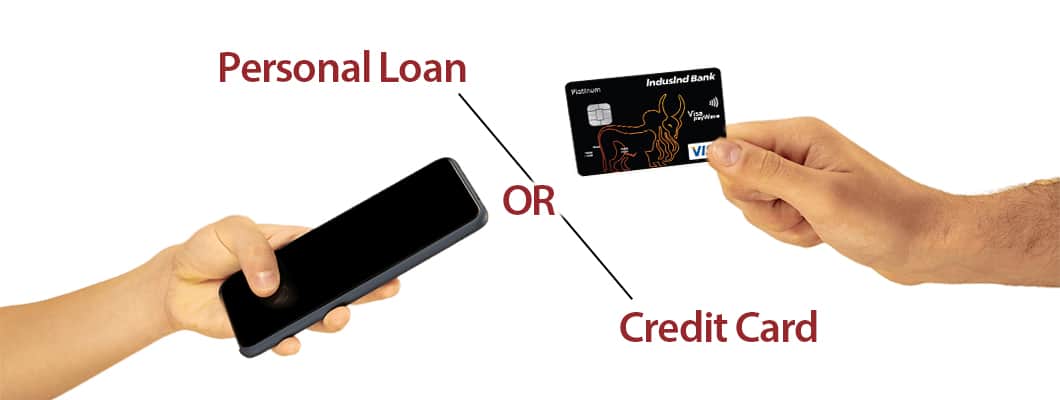
Credit Card vs Personal Loan: Which One is Best for You?
Posted on Thursday, March 30th, 2023 | By IndusInd Bank
Credit card and personal loan are both common forms of borrowing money, but they work differently and have different benefits and drawbacks. Understanding the differences between a credit card and personal loan can help you make an informed decision about which one is best for you. Let’s dive a little deeper to know in detail.
Credit Card
A credit card is a borrowing option that provides you with credit amount up to a certain limit set by the card issuer. You can use your credit card to make purchases, pay bills, and withdraw cash from ATMs. As you use your card, you’ll accumulate an outstanding balance that you’ll need to pay off each month by the due date.
Pros of Credit Cards
- Convenience: Credit cards are incredibly convenient. You can use them to make purchases online or in-person, and you don’t need to carry cash with you.
- Rewards: Many credit cards offer reward programs that can earn you points, miles, or cashback for your spends.
- Build Credit: Mindful, responsible use of a credit card can help you build your credit score. This can especially be useful if you’re just starting out and don’t have a credit history.
Cons of Credit Cards:
- High-Interest Rates: Credit cards typically have higher interest rates than a personal loan. This means that if you carry a balance on your card beyond the due date, you’ll end up paying more in interest charges.
- Risk of Overspending: With greater convenience of use comes the temptation to overspend as well. Therefore, if you’re not careful with your budget while using credit cards, you might end up in too much debt.
- Fees & Charges: Credit cards are often fraught with tricky terms & conditions and there are many types of fees associated with them such as joining fees, annual fees, balance transfer fees, and cash advance fees.
Personal Loan
A personal loan is a borrowing option that allows you to borrow a fixed amount of money and pay it back in regular installments over a set period of time. It is typically unsecured, meaning you do not need to provide collateral or guarantee (like your home or car) to secure the loan. However, some lenders may require a guarantor or collateral.
Pros of Personal Loans
- Lower Interest Rates: A personal loan typically has lower interest rate than credit cards. This means that you’ll pay less in interest charges over the repayment tenure of the loan.
- Fixed Repayment Schedule: With a personal loan, you’ll know exactly how much you need to pay each month and when the loan will be paid off in full. This can help you plan your budget and expenses better.
- Large Borrowing Limits: Depending on your credit score and income, you may be able to borrow a larger amount of money with a personal loan than you would with a credit card.
Cons of Personal Loans
- Complex Application Process: Applying for a personal loan can take longer than applying for a credit card. You may need to provide more documentation and go through a more extensive process. However, this does not hold true for all lenders. IndusInd Bank provide an easy online application process and offers instant approval.
- Less Flexibility: With a personal loan, you’ll receive a lump sum of money that you’ll have to repay in fixed installments and won’t be able to borrow more money until you pay off the loan.
- High Processing Fee: Typically, most lenders have a set processing fee that needs to be paid by the borrower before sanctioning the loan. This fee may vary basis the required loan amount.
Which One is Best for You?
Deciding between a credit card and a personal loan depends on your financial situation, borrowing needs, and personal preferences.
A credit card is an ideal pick for you if:
- You need flexibility: If you need to make multiple purchases over time or have unpredictable expenses, a credit card or line of credit can give you the flexibility to borrow money as you need it.
- You have a short-term borrowing need: If you only need to borrow money for a short period of time, such as a few weeks or months, a credit card or line of credit may be a better choice than a personal loan.
- You want to build credit: Using a credit card or line of credit responsibly can help you build a positive credit history, which can help you qualify for better loan terms in the future.
A personal loan is an ideal pick for you if:
- You need to borrow a large amount of money: A personal loan may be a more affordable choice than using credit if you need to borrow a large amount of money.
- You prefer fixed payments: If you prefer the stability of fixed monthly payments, a personal loan may be a better choice than a credit card, which can have variable interest rates and payments.
- You want to consolidate debt: If you have high-interest debt, such as credit card debt, consolidating it with a personal loan is easy.
To conclude, by the information presented above, you would now be easily able to decide which borrowing option best suits your requirements as per the end use.
If you’re looking for a personal loan that doesn’t have collateral requirement and is available instantly, then look no further than IndusInd Bank Personal Loan. It has 100% paperless application process with flexible repayment tenure options and best-in-class interest rate. Moreover, you can also grab the limited time offer of ZERO processing fee. Pay nothing and get your funds quickly in no time.
Disclaimer: The information provided in this article is generic in nature and for informational purposes only. It is not a substitute for specific advice in your own circumstances. Hence, you are advised to consult your financial advisor before making any financial decision. IndusInd Bank Limited (IBL) does not influence the views of the author in any way. IBL and the author shall not be responsible for any direct/indirect loss or liability incurred by the reader for taking any financial decisions based on the contents and information.



 Offers
Offers Rates
Rates Debit Card Related
Debit Card Related Credit Card Related
Credit Card Related Manage Mandate(s)
Manage Mandate(s) Get Mini Statement
Get Mini Statement
 categories
categories Bloggers
Bloggers Blog collection
Blog collection Press Release
Press Release


